#The IGBO LANDING STORY
Explore tagged Tumblr posts
Text
JAZZ - "IN HONOR OF THOSE WHO CHOSE THE SEA" - A Multimedia Mural
by Malaika H Kambon 12/10/2024 “I just want to start out playing music and see wherever it will go into and let it do what it wants to. I’m not really planning what I’m going to do, as if I would be playing some commercial stuff. I’m just trying to let things happen. But then you need people with you who are able to realize when it starts to happen and who have the mental ability to release…

View On WordPress
#African/Black experience#Afrikan#culture#freedom#Haiti#Haitian revolution#history#jazz bassist#PALENQUE#Pharoah Sanders#politics#Slavery#The Door of No Return#The IGBO LANDING STORY#The People Can Fly#There is always music#War on Afrikans
1 note
·
View note
Text

Did You Know That?
Beyònce's "Lòve Dròught" video was in memory of the "Igbo Landing" story. An act of mass resistance against slavery.
A group of enslaved Igbo's revolted, took control of their ship, and rather than submit to slàvery, they drowned themselves.
When they were drowning, they were singing in Igbo, a song that translates to:
"The water spirit brought us. The water spirit will take us home". (Mmụọ mmiri du anyị bia, mmụọ mmiri ga-edu anyi laa)
78 notes
·
View notes
Text
This month in Hoodoo History: The Igbo Freedom Landing March
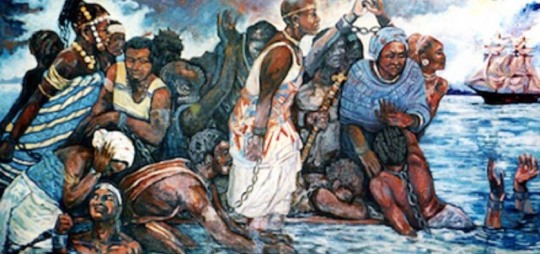
In May of 1803, 75 Igbo men & women chose freedom in death over a life of hell, spurring one of the largest mass suicides in the history of Maafa.
• In May 1803, a British slave ship called, The Wanderer, captured over a hundred Igbo men/women & other West Afrikan Peoples from present-day Nigeria and taken to Savannah, GA.
In Savannah, they were resold into Slavery to be worked to death on plantations along the Georgia coast. The price for each of their lives? $100. They were forcibly transported onto a ship called, the York that set sail for St. Simon's Island.
• During this voyage from Savannah to St. Simon's Island, 75 Igbo men & women rose up against their captors. They drowned the slavers, took control of the ship - grounding it in the Dunbar Creek.
At some point, the Igbo fled the ship. Led by their High Chief, a subset of the Igbo sang as they marched into a salt marsh of Dunbar Creek. One by one, they returned home in the face of a fate worse than death.
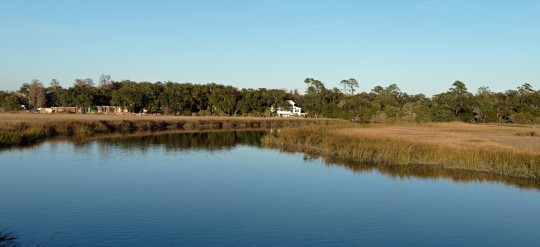
• This event that became known as, the Igbo Freedom Landing March, spawned enormous symbolism & folklore in the Afrikan Peoples and their descendants on this land. Many believe that the Freedom Landing and the nearby salt marshes in Dunbar Creek are haunted by the Spirits of the Igbo Peoples who drowned there. It is heralded as the first recorded Freedom March in U.S. history and has long since been a staple in Gullah-Geechee folklore, as the story of the Igbo Peoples who chose death over Slavery.
• Today, Igbo Landing is a nationally recognized historical site. It is located at Dunbar Creek on St. Simon's Island in Glynn County, GA.
• In September 2002, the Afrikan descendant community of St. Simon's Island, GA held a two-day commemoration of this event, including a procession to the salt marshes along Dunbar Creek where the mass suicide took place. They were represented by 75 Afrikan descendants across the country, Haiti, Brazil, & Nigeria. The attendees consecrated the site and did the collective work to elevate the restless Igbo spirits into healing and peaceful transition.
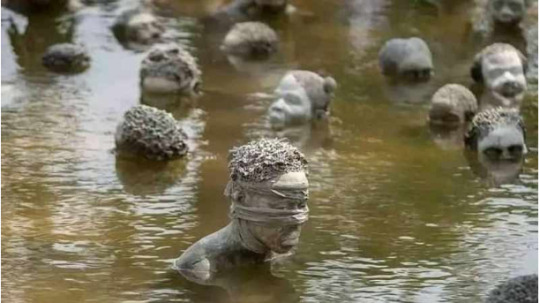
#hoodoo#hoodoos#atr#atrs#the hoodoo calendar#juju#igbo culture#igbo history#igbo#afrikan#igbo freedom landing March#black history#Hoodoo Folklore#west Afrika#Nigeria#Nigerian history#Georgia#Georgia history#Savannah#st simons island#african american folklore#Hoodoo History
150 notes
·
View notes
Note
I’ve been catching up on early TFA, I’m on Chapter 3. I saw that TFA is in reference to the book by Chinua Achebe. I don’t know how I didn’t connect it sooner, but that book is one of my favorites. I wrote a paper on the parallelism between the fall of Okonkwo and the Igbo culture through colonization. I never hear anyone talking about the book; Achebe is such an amazing writer, and I’m so glad to be reminded of it. I just bought the book on my Kindle to reread since it’s been so long. Would love to pick your brain on book recommendations!!
OMG, friend... I am super annoying about literature and am forever down for book recs, in fact, look where the book landed

*kicking my feet*
Achebe is incredible AND I believe this should be among the classics. It was required reading for me too but I lost my mind and read it about 3 more times and bought 2 more copies. I truly think its an allegory for life in many ways. For the purposes of a sims story, I used the title very literally in that things will fall apart... but then what? In Okonkwo's case, it was met with violence, intense anger. You'll see that play out as the story progresses. I think you just gave me the bug to read it again, thank you friend!
#fun fact: i have a massive book collection#that is never massive enough lol#story stuff#its also the title of my favorite album
17 notes
·
View notes
Text

Hi! My name is Stephanie Byron-Ene, and I am the writer and director of Omenala (Oh-May-Nah-lah), which translates to "As it is in the land." 🇳🇬 First, I’ll like to give you a little bit of my backstory. I’m Nigerian, from the Igbo tribe, and grew up in Lagos State before coming to the U.S. to study film. My passion for filmmaking started early. At just 10 years old, I would join my father on Nollywood sets at 4 a.m.— often just to hold the actor’s purse — but those experiences deeply shaped my love for storytelling. 🎬👜 I’m so excited to share this story and would love for you to be part of the journey! 🥰
#crowdfunding#short film#filmmaking#igbo culture#african culture#lagos nigeria#nigerian film#nollywood#directing#filmmaker#lagos state#student film#adobe#graphic design#screenwriting
6 notes
·
View notes
Text
Black Gods and Goddesses: 6 Mythological Figures of the African Cultures - Spotcovery
Anansi the Trickster Spider
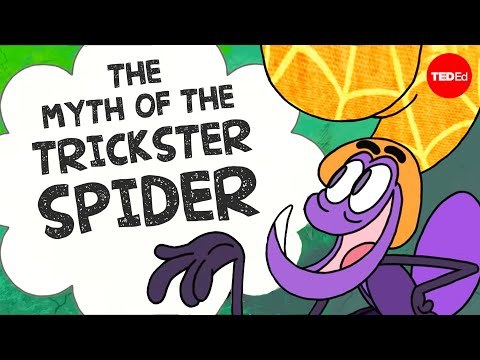
Anansi is a black god that usually appears as a spider but can take on human form. It’s a central mythological figure in the tradition of most West African cultures, especially among the Akan people of Ghana and the Ashanti region. He’s known as the spirit of all tales and knowledge.
Modjadji
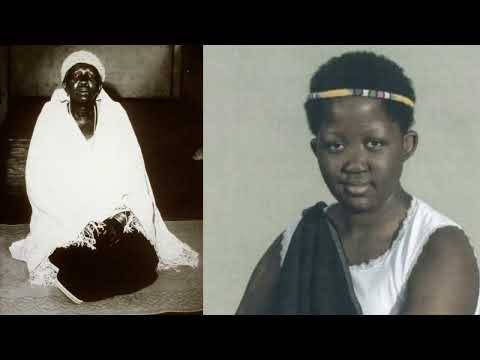
Queen Modjadji, also known as the Rain Queen is South Africa’s rain goddess. Modjadji spirit dwells in the body of a young lady who’s seen to be the queen of the Balobedu ethnic group. The people of Balobedu believe that the rain queen has the power to control the clouds and rainfall.
Amadioha
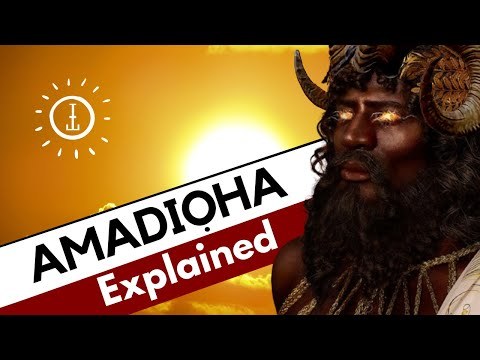
Another popular mythological figure of African culture is Amadioha. He’s the Agbara or arusi (spirit worshiped in Igbo land) of the thunder and lightning of the Igbo people of southeastern Nigeria.
Amadioha is known as the god of justice. He talks through thunder and strikes through lightning. Anyone found guilty by Amadioha is usually killed by lightning.
Mami Wata

When you think of beauty and attractiveness, Mami Wata has them in abundance. Mami Wata is a water spirit worshiped in Central, West, and Southern Africa and in the Afro-American diaspora. She has a female human upper and a serpent or fish lower part.
Mami Wata represents good fortune, wealth, healing, and the threat of destruction to those who go against her rules. She’s celebrated and worshiped in rivers through rituals of music and dance. Many books on Amazon can teach you more about Mami Wata.
Loa
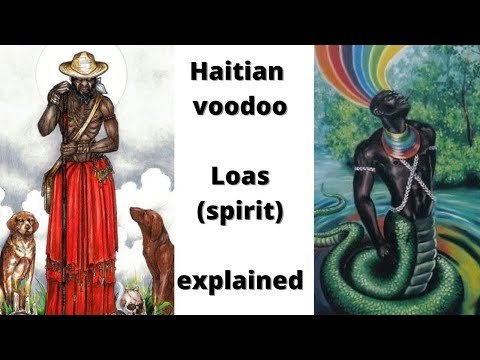
Iwa, also known as Loa, serves as the mediator between humanity and the divine. In their thousands, they guide, heal, and protect the loyal followers of the voodoo tradition.
Voodoo is a region that’s unknown to many people. It’s more associated with witchcraft and devil worship than it’s recognized as a region.
But people who attribute Voodoo and its tradition as satanic are often not aware of its rich folklore and culture. The Voodoo’s thousands of Loa represent years of creativity, intercultural mixing, and spiritual resilience.
Takhar
Takhar is known as the god of justice or vengeance. It’s a demi-god in the Serer religion in Gambia, Senegal, and Mauritania. People worship Takhar so that he can protect them against bad omens, abuse, and injury.
The worshipers offer cattle and poultry as sacrifices to him under the tallest trees. They keep the sacrifices there because they believe that he lives in the upper branches of a tree. The fear of being visited by Takhar prevents people within the Serer religion in Gambia, Senegal, and Mauritania from committing crimes.
Africa is a continent with rich culture and traditions. And the continent’s story is incomplete without the mention of their god and goddesses. The reason is that the people of the African region have always believed in mythological figures. The ones covered here are the most popular ones.
#Black Gods and Goddesses: 6 Mythological Figures of the African Cultures#Black Gods#ATR#African Traditional Religion
10 notes
·
View notes
Text
Some people will say a woman is subordinate to men because it's our culture. But culture is constantly changing. I have beautiful twin nieces who are fifteen. If they had been born a hundred years ago, they would have been taken away and killed. Because a hundred years ago, Igbo culture considered the birth of twins to be an evil omen. Today that practice is unimaginable to all Igbo people.
What is the point of culture? Culture functions ultimately to ensure the preservation and continuity of a people. In my family, I am the child who is most interested in the story of who we are, in ancestral lands, in our tradition. My brothers are not as interested as I am. But I cannot participate, because Igbo culture privileges men and only the male members of the extended family can attend the meetings where major family decisions are taken. So although I am the one who is most interested in these things, I cannot attend the meeting. I cannot have a formal say. Because I am female.
Culture does not make people. People make culture.
-Chimamanda Ngozi Adichie, We Should All Be Feminists
10 notes
·
View notes
Text
masculine african names

ajani [nigerian, yoruban] “the victor”
akachi [igbo] “the hand of god”
akello [ugandan] “i have brought forth”
amari [yoruba] “eternal”
ayo [yoruba] “joy”
azizi [swahili] “precious treasure”
barack [swahili] “blessing”
chima [igbo] “god knows”
dakari [shona] “rejoice”
djimon [yoruba] “powerful blood”
dumi [african] “the inspirer"
ejiro [urhobo] “praise god”
enitan [yoruba] “person of story”
eskender [amharic] “defending man”, amharic variation of alexander
farai [shona] “rejoice”
gahiji [rwandan] “the hunter”
garian [libyan] a town in northern libya
haji [swahili] “born during the pilgrimage to mecca”
ikenna [igbo] “father’s power”
iniko [nigerian, igbo] “born in a time of trouble”
itoro [ibibio] “praise, glory”
itri [berber] “star”
jatau [hausa] “light, fair”
jengo [swahili] “building”
kabelo [sotho] “given”
kamau [kikuyu] “quiet warrior”
kato [ugandan] “second of twins”
kayin [yoruba] “celebrated child”
khamisi [swahili] “born on thursday”
khari [west african] “kingly”
kofi [akan] “born on friday”
kojo [akan] “born on monday”
kwame [akan] “born on saturday”
lekan [yoruba] “my wealth has increased”
limbani [chewa] “be strong”
mandela [african] an african surname
masozi [tumbuka] “tears”
massai [african] “owner of land and farms”
mosi [swahili] “first born child”
nairobi [kenyan] the capital of kenya
neo [tswana] “gift”
nnamdi [igbo] “my father is alive”
obi [igbo] “heart”
odion [esan] “first born of twins”
okello [ugandan] “born after twins”
okoro [urhobo] “man”
omari [swahili] “populous”
oyibo [urhobo] “white”
rudo [shona] “love”
sefu [swahili] “sword”
sekani [tumbuka] “laugh”
selam [amharic] “peace”
tadesse [amharic] “revived”
tafari [amharic] “he who inspires awe”
tariku [amharic] “his story”
tatenda [shona] “thank you
taye [ethiopian] “he has been seen”
tendaji [swahili] “make things happen”
udo [igbo] “peace”
unathi [xhosa] “god is with us”
uzochi [igbo] “god’s way”
yao [ewe] “born on thursday”
zaire [kongo] “the river that swallows all rivers”
zesiro [luganda] “older of twins”
zuberi [swahili] “strong”
zuri [swahili] “good, beautiful”
3 notes
·
View notes
Text
Reuben Abati Faces Backlash Over Claims of Igbos Refusing to Sell Land to Non-Indigenes
Between Arise Tv anchors, Reuben Abati and Ojy Okpe over his story about Igbos not selling land to other indigenes It all started on Thursday November 21 when Abati shared the story of how a former Minister who had an Igbo wife and daughter had intended to build a house for himself in the East but was unable to achieve this as he was told by his Igbo inlaws that they do not sell land to…
0 notes
Text
It's been almost a year since I visited St. Simons Island in Georgia to see the new historical marker devoted to this site, but for some reason, every time I sat down to make a post about it, I couldn't bring myself to do it. Nearly all of the content I post here should come with a trigger warning-- any story of resistance is necessarily a story of horrible oppression-- but this one hits a little harder. Igbo Landing (also spelled Ebo or Ibo) is the location of an 1803 shipboard revolt and a mass suicide of Africans who were bound for enslavement and took to the water in chains rather than allow themselves to be sold into bondage. Below you can see the marker, which was unveiled in May 2022, and a photograph I took at the Historic Harrington schoolhouse, which displays an artist's rendering of the Igbo insurrection by artist Diana Dee Williams. The marker is in a nearby park, but the actual site where the event likely took place on Dunbar Creek is on private land and inaccessible to foot traffic.
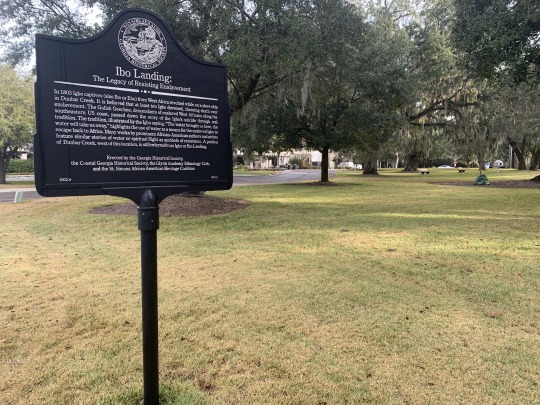
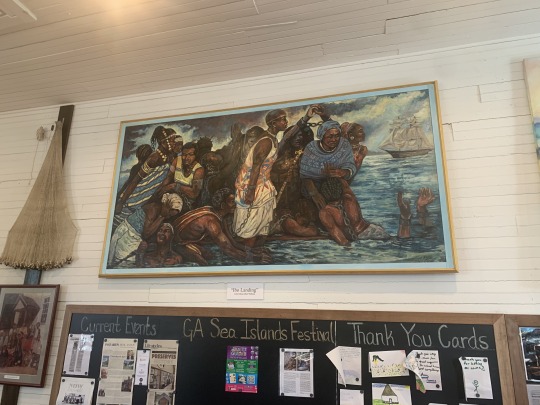
0 notes
Text
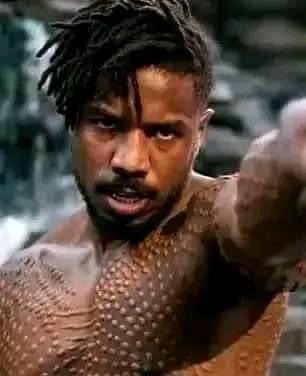
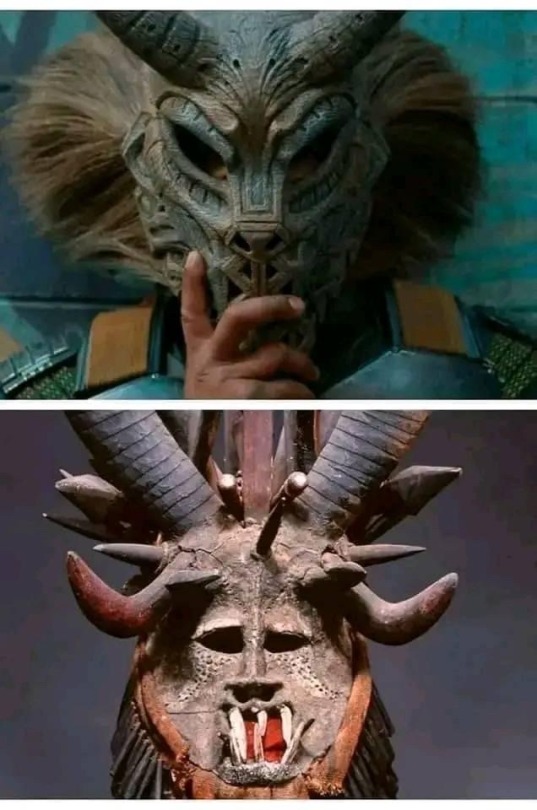
THE IGBO STORY IN THE MOVIE BLACK PANTER
In the movie The Black Panther, Erik Killmonger wore a very distinctive mask that he had taken from the British Museum. Additionally, Killmonger uttered the most famous words of the movie when he said, "just bury me in the ocean with my ancestors who jumped from the ships because they knew that death was better than bondage". There is a deep connection between those words and the mask that Killmonger wore.
The mask of Killmonger is from the Igbo people who are from Eastern Nigeria.
In May of 1803, a significant event took place known as the Igbo Landing. After crossing the Middle Passage, a slave ship arrived in Georgia with a cargo of slaves. 75 of those people were Igbo people and they were sold for roughly $100 each. They were then transferred to another ship to be moved to their destination. Once upon the new ship, the Igbo people rebelled. During the rebellion, the Igbo people killed their captors and took control of the ship. With no way of returning home and facing the likelihood of being recaptured into slavery, the Igbo people agreed to commit suicide...together. They all jumped into the ocean and drowned.
This is what Killmonger was referring to when he said, "just bury me in the ocean with my ancestors who jumped from the ships because they knew that death was better than bondage".
82 notes
·
View notes
Text
The Real Story of Igbo Landing: "The Victims were my brothers and sisters from Omambala. I still hear their cries at midnight"- Pete Edochie reveals.
View On WordPress
0 notes
Text
Behold an Economic Terrorist

A man tasks his brain to write a story. He goes to the bank or friends or both to raise funds. He commits himself to so much debt to finance his dream of a good movie, hit stardom, and make good money in the process. He gets an excellent crew at a great cost. Together they spend sleepless nights putting the film. It is beautiful work and success is achieved through hard work. It was then only a matter of taking the films to cinemas to make money, recoup costs, and achieve profit and stardom. But Amaechi Okeke is in Alaba International Market working hard to destroy the poor man's dream. He had ZERO INVESTMENT in the intellectual property. He had ZERO INVESTMENT in the cost of production. He had ZERO INVESTMENT in the various risks of the venture. All he does is to get enough DUBBING MACHINES, ENOUGH CDs, AND PLENTY OF HIS KINSMEN WHO ARE APPRENTICES and he was in business. He will make copies of that production run to the market and begin to sell at prices that the original owners can never compete against. At the end of the day the ORIGINAL OWNER is in debt but AMAECHI OKEKE is in money. The original owners will start selling his properties to defray debts and Amaechi Okeke is the same person to whom he will sell the properties. It is called PIRACY, IT IS A CRIME. The same thing they did with BOOK AUTHORS and soon nobody was writing books anymore. If you ever produce anything that catches the market, the IGBO ZIONISTS will get the IMITATION, destroy your efforts and they will make far more money than you in the process This is what the ZIONISTS have been doing to Yoruba people in Yoruba land since the 1980s. It is what they did to Adebowale Electrical Industries, Oluwalogbon Motors, All our Pharmaceuticals, and the majority of the companies that folded up in the SW INDUSTRIAL AREAS. They simply IMPORTED MASS-PRODUCED IMITATIONS OF THEIR PRODUCTS and those companies could never compete and had to go down. Those once vibrant companies went under and had to lay down their staff, the majority of them Yoruba people who were once prosperous. They started selling their properties. The ZIONISTS made money and they started buying from the same men who they had engineered into POVERTY. THIS IS NOT ONLY A CRIME OF IMITATIONS BUT THAT OF TERRORISM - ECONOMIC TERRORISM. It is what they have been doing since the early 1980s masquerading as TRADING and now they have advanced from Lagos into Ogun State and steadily destroying the people there and buying up their spaces. And the population of the ZIONISTS are growing heavily under your noses and their sole ambition is to buy up your space while making money destroying you!!! Àwon Asiwèrè èdá. But the Yoruba people will never understand it as what it is - TERRORISM - but see it as competition and even join the ZIONISTS to accuse themselves of being lazy. I fear for Yoruba land. © Adedamola Adetayo 23 August 2023 Read the full article
0 notes
Text
Letters from Osun-Oxum continuation of Communication Discourse Review of The University Scholars by Azurite
Im coming to you all with a requested input from the Osun-Osogbo Festival 2023. I have learned of Osun from multiple sources, one of many I paid no mind to due to the exploitative nature of these messengers. I am now working with Osun out of respect for the healing we have done collectively. We have a mutually beneficial relationship similar to how my relationship with Esu-Exu, and Ellegua started in Atlanta many years ago. We found a "scholarly" article written by a professor at a university in Texas named Joni L. Jones
and used this for a Communication Research assignment last semester as a way to make peace with xenophobia and exploitation of Osun's divine blessings by many indiviuals throughout higher education across the globe. We first were inspired by this work due to an article by a Nigerian Professor named Ahmed O. Adesanya, PhD whom wrote about Artifactual Code and non-verbal communication through the intricate beadwork in Yoruba culture. The PDF Link is Below.
A article that changed my lense of spiritual practice forever. I thought I can be a scholar and write about the things I enjoy such as beadwork and spirituality. Anyways... I decided to go on YouTube and look up the Osun-Osogbo Festival and watched a video; in this video a statue was shown that caught my eye and it would not let me forget about it. I immediately began to look up this statue and the ancestor in which this statue was of the first traditional ruler (1st Ataoja of Osogbo) in 1670 and ruled for a period of 90 years until his death in 1760, and he was mentioned as Larooye which happens to be a salutation to Exu in Brazilian Umbanda practices. This particular video with participants of the Osun-Osogbo Festival had interviews of people an one of our Nigerian professors from last semester got her undergraduate degree in Osun State. We aren't a fan of the woman she was very xenophobic and her energy made my nerve ending stand on edge, but we did learn a valuable lesson from her an that was you do not have to be born in Nigeria to have a connection with the ancestors of nigeria. Also Osun doesn't only work with people in Nigeria. Now I will always respect those born in the lands of the orixá but I also knew that for some reason Osun and many other Orixá chose me to tell their stories. I was chosen to get the truth out while also restoring the medicine to their chosen heirs that have been pimped out by colonizers and babalaôs for a long time. Osun despises one thing and that is kidnapping, slavery, pimp culture, and exploitation in all its forms.
youtube
If we look at the corruption of the Nigerian government and all its scandals in isolation grants Osun a whole lot to be angry about. People give this docile and only sweet persona of Osun, the way she has taught me an showed up is far from docile. Osun does not play about her space and is a stickler on boundaries. Osun will go to war for her loved ones and has been a healer of wounds new an old regarding human trafficking, slavery, and kidnapping. Osun in our opinion is one if not the most powerful orixá of them all. The concepts to take from this Hood Scholar Article is to use your knowledge of Yoruba & Igbo to dissect the Osun Festival as it stands today. It also is a challenge of why aren't more of the traditional leaders that statues still stand in the cities across nigeria not known more about to the devotees of Osun. Osun has become a global superstar over the last 10 years and very little is known about her true essence, what she stands for, and how she like to be treated. If you are going to call yourself a priest or priestess shouldn't you at least know the language of the lands in which Osun story originates ? The wealth and healing of Osun should be flooding the gates of Brazil, Nigeria, and the lives of her loved ones why is it being exploited for the pleasure of corrupted elites ? Im going to leave these questions there until next time. Its your homegirl Azurite and this is a Trapppland Exclsuive. Please make sure you cite me if you use my wisdom and any others of the scholars in your content. Thanks Osun for all you do, I love you -Azurite
Published Wednesday August 16th, 2023

1 note
·
View note
Text
Look to your left. The first object you see is your weapon in battle. What is it and would you survive?
My item is a blanket. I could use it as a whip or just wrap myself in it and hope someone takes pity. 😂 I'm probably not surviving long.
Cameron Battle and the Hidden Kingdoms is a book based on West African and Igbo history and mythology and sounds really interesting. I don't know that I've read many books based on cultural history except maybe a few with Chinese history. As for mythology, I've read quite a bit of Greek myths/retellings and a little bit of Celtic myth retellings and inspired works. I'd like to branch out more.
Synopsis below.

SYNOPSIS:
Cameron Battle grew up reading The Book of Chidani, cherishing stories about the fabled kingdom that cut itself off from the world to save the Igbo people from danger. Passed down over generations, the Book is Cameron's only connection to his parents who disappeared one fateful night, two years ago. Ever since, his grandmother has kept the Book locked away, but it calls to Cameron. When he and his best friends Zion and Aliyah decide to open it again, they are magically transported to Chidani. Instead of a land of beauty and wonder, they find a kingdom in extreme danger, as the Queen's sister seeks to destroy the barrier between worlds. The people of Chidani have been waiting for the last Descendant to return and save them . . . is Cameron ready to be the hero they need?
Inspired by West African and Igbo history and mythology, this adventurous middle-grade fantasy debut perfect for fans of Aru Shah and Tristan Strong celebrates the triumphs and challenges of a boy finding his true path to greatness.
#RCJune23#RainbowCrate#rainbow crate book box#a spark of magic#cameron battle and the hidden kingdoms#jamar j perry#jamie lynn lano#collectible magnet#bookish magnets#lgbtq reads#lgbtqia#queer book recs#read with pride#read queer all year#stardustandrockets
1 note
·
View note
Text
1 note
·
View note